|
|
|
Sort Order |
|
|
|
Items / Page
|
|
|
|
|
|
|
| Srl | Item |
| 1 |
ID:
160622
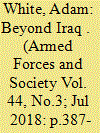

|
|
|
|
|
| Summary/Abstract |
Through the lens of veterans studies, we know a great deal about the fate of those soldiers who have recently returned home following a period of deployment in Iraq and Afghanistan, yet counterintuitively we know nothing about the plight of the private military contractors who worked alongside them. Addressing this blind spot, the article explores the socioeconomic trajectories of “private military veterans” from a life-course perspective. Specifically, it addresses three questions regarding their status in the civilian labor market. What occupations do they work in? To what extent do they work in similar occupations to public military veterans? To what extent do they work in similar occupations to the general population? Focusing on the U.K. case, it reveals that private military veterans are significantly overrepresented in the “protective service occupations,” where they primarily work in the private security industry, and offers a multilayered explanation for this distinctive clustering effect.
|
|
|
|
|
|
|
|
|
|
|
|
|
|
|
|
| 2 |
ID:
160626
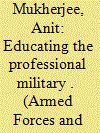

|
|
|
|
|
| Summary/Abstract |
This article analyzes the ways in which civil–military relations shape professional military education (PME). Its main argument is that military education benefits from a civil–military partnership. In doing so, the article examines the role of civil–military relations in shaping PME in India. While describing the evolution of military education in India, it analyzes its weaknesses and argues that this is primarily due to its model of civil–military relations, with a limited role for civilians. Theoretically, this argument challenges Samuel Huntington’s notion of “objective control”—which envisaged a strict separation between the civil and military domains. Conceptually, this article argues for a greater dialogue on military education among civilians, both policy makers and academics, and military officers and not to leave it to the military’s domain—as is currently the practice in most countries.
|
|
|
|
|
|
|
|
|
|
|
|
|
|
|
|
| 3 |
ID:
160629


|
|
|
|
|
| Summary/Abstract |
Several distinguished scholars have contributed previously to this debate and I have been privileged to consider their arguments. In doing so, I have been mindful that the realities of life frequently pierce the armor of high-minded principles. An important caveat on my views is that the debate is about senior officer resignation in the U.S. armed forces. A distant observer might therefore miss some of the important nuances at play, but it is difficult not to conclude that the U.S. armed forces exercise significant political influence in their own right and collectively through the Joint Chiefs of Staff. They are certainly major cogs in the formidably complex machinery of both government and politics.
|
|
|
|
|
|
|
|
|
|
|
|
|
|
|
|
| 4 |
ID:
160628
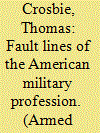

|
|
|
|
|
| Summary/Abstract |
Over the past decade, the American armed services have witnessed a near-constant stream of so-called ethical lapses. Spanning rank, specialty, and service, these “lapses” have given rise to a flood of criticism by journalists and piercing calls for reform from politicians. In response, American military leaders have pointed to the paired concepts of profession and professionalism as the solution. In this article, we use classical conceptualizations of the military profession to resituate the problem of ethical lapses as instead one of the three fault lines of the contemporary American military profession, unfolding alongside crises in military expertise and identity. The three fault lines reveal at once the large scale of the challenges facing the American armed services and our very limited social scientific understanding of those problems. We end by emphasizing the need for future research to establish an updated empirical baseline for theories of the military profession in America.
|
|
|
|
|
|
|
|
|
|
|
|
|
|
|
|
| 5 |
ID:
160624
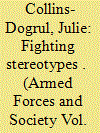

|
|
|
|
|
| Summary/Abstract |
This study examines reader responses to opinion editorials about women in combat and contributes to the literature on women in the military by explaining how contests over sex–gender essentialism and diversity underlie public debates about individual rights and military effectiveness. Comments in favor of women’s ground combat exclusion use a logic of averages to promote essentialist thinking about men and women. They categorize women as inferior soldiers and argue that desegregation puts individual soldiers and the nation at risk. Conversely, comments in favor of integration advance a view of sex–gender diversity that places men and women along a continuum with overlapping qualities, suggesting further that giving exceptional women the freedom to serve in ground combat will advance both equality and military readiness. We argue that public commentary about women in combat concerns more than the military, underlying this discourse are distinct conceptions and expectations of men and women.
|
|
|
|
|
|
|
|
|
|
|
|
|
|
|
|
| 6 |
ID:
160627
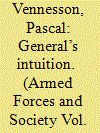

|
|
|
|
|
| Summary/Abstract |
Can we trust the operational intuitions of generals? The proponents of the overconfidence model, one of the most influential perspectives in the psychology of judgment, commonly offer a skeptical answer. Generals’ operational intuitions are likely to be hampered by overconfidence and negatively affect military effectiveness. However, the successful operational outcome of General Douglas MacArthur’s decision to land at Inchon (June–September 1950) seemingly contradicts the model. We seek to complement and refine the overconfidence model by examining the Inchon landing decision through the analytical lens of the recognition-primed decision model. This model typically envisions that under specific circumstances—notably an experienced decision maker, an adequate environment regularity, and an opportunity to learn—generals are able to make quick and satisfactory decisions. We show that such a configuration was present in the Inchon landing case and helps explain both the decision process and its successful outcome.
|
|
|
|
|
|
|
|
|
|
|
|
|
|
|
|
| 7 |
ID:
160623


|
|
|
|
|
| Summary/Abstract |
While many states earmark lottery proceeds for education programs, a few states have started allocating portions of lottery revenues toward state-provided services for military veterans. The decision to shift funds toward veterans’ services and away from other programs creates an opportunity to study society’s willingness to help veterans when faced with real trade-offs. Using county-level data from three states, I examined public interest in veterans’ lottery tickets by analyzing consumer and voter behaviors. In two states that sold veterans’ tickets, IA and TX, a similar set of county-level variables explained variation in both veterans’ and nonveterans’ ticket sales. However, there were a few cases in which sales patterns differed across ticket categories. Election results from a statewide referendum in MO to create a veterans’ lottery ticket suggested that opposition came from counties with a large proportion of college graduates and high population densities.
|
|
|
|
|
|
|
|
|
|
|
|
|
|
|
|
| 8 |
ID:
160625
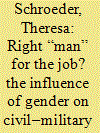

|
|
|
|
|
| Summary/Abstract |
The purpose of this study is to investigate the impact of women in politics on the risk of a coup d’état. Previous research indicates that the relationship between female political leaders and security is dependent on the office she holds. Subsequently, we expect female legislators to have a different influence than a female chief executive on the likelihood of a coup. We argue that a higher level of female representation reduces the risk of a coup d’état. However, we assert that a female chief executive has a different effect and increases coup risk. Using data covering 160 states over the years 1952 to 2009, our empirical tests provide support for our expectations. All else being equal, increased levels of women in parliament lead to a substantial drop in coup likelihood. However, the argument that a female chief executive will be more coup prone is not fully supported in our findings.
|
|
|
|
|
|
|
|
|
|
|
|
|
|
|
|
|
|
|
|
|